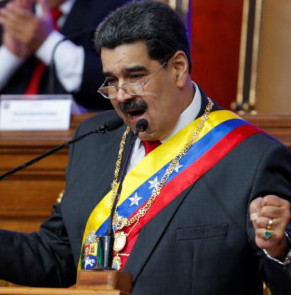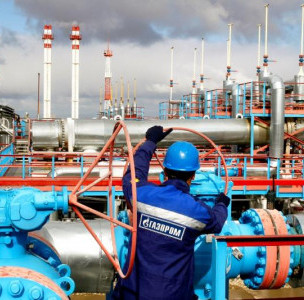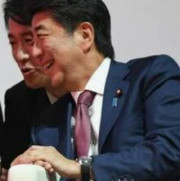As has been reported, on October 26, addressing a youth conference in Tehran entitled "The World without Zionism", President Ahmadi-Nejad publicly called for Israel to "be wiped off the map of the world". Allegedly he was citing the late ayatollah Homeini. The immediate cause for such a violent attack was the latest events in Palestine where Israel carried out a large-scale retaliatory action against Palestinian gunmen. Seemingly, Iran's President wanted to support Palestinians in that way. Of course, any serious intention by Iran to destroy Israel militarily is ruled out.
Possibly, M. Ahmadi-Nejad's words were originally meant for "internal consumption", but, having received wide publicity, they caused a stormy reaction all over the world, first of all in Israel and Western countries. Israel's leadership immediately demanded that Iran be expelled from the UN, and the Security Council be urgently convened, pointing out that since the formation of the UNO in 1945 no head of any member state of that organization had ever called for the destruction of another member state.
Inside the UN itself, M. Ahmadi-Nejad's declaration, according to UN Secretary General Kofi Annan, caused consternation. Iran's ambassadors to Great Britain, France, Spain, Canada and a number of other countries were summoned to the foreign ministries of those countries, where they received notes of strong protest. A spokesman of the US administration noted that M. Ahmadi-Nejad's words reconfirmed what Washington had been saying about the regime in Iran and underscored its concerns about Iran's nuclear intentions.
Still sharper was the reaction of British premier Tony Blair who expressed his "disgust" of M. Ahmadi-Nejad's pronouncement and called them "quite and absolutely unacceptable". Addressing heads of government of EU member countries at an informal summit near London, T. Blair said: "Can you imagine that such a state, with such an attitude towards the world, got nuclear weapons?"
Even Iran's friends met the Iranian President's words with certain bewilderment. Thus, Russian Foreign Minister Sergei Lavrov said that "no one can call in question the right of any UN member state to exist" and called M. Ahmadi-Nejad's statement "quite inadmissible". He also acknowledged that now those who wanted the issue of Iran's nuclear program to be put up for the UN Security Council's scrutiny had received an additional argument. It is noteworthy that even the Palestinian representative at the talks with Israel, Saeb Erekat, said that "one had better work for the Palestinian state to be put on the map, rather than to have Israel wiped off it ".
Against this background, on October 28 the Security Council unanimously condemned M. Ahmadi-Nejad's declaration. There are indications that the anti-Israeli jab of Iran's President was unexpected also for many Iranian officials and diplomats. For example, the Iranian Embassy in Moscow released a statement saying that the Iranian President "had not meant to speak sharply about Israel" and get involved in a conflict.
However, the Iranian President himself was not going back on his words. At a massive anti-Israeli demonstration held in Tehran on October 29 he declared that his words were "true and just" and attacked the US and Israel saying that "those arrogant creatures think the whole world has to obey them". M. Ahmadi-Nejad was very much angered by "the feeble reaction" of the Iranian ambassadors to the international condemnation of his speech against Israel and the West. He sacked the Iranian ambassadors to Great Britain, Germany and France and recalled to Tehran another 18 heads of diplomatic missions.
The Iranian President called to witness the full support given to his pronouncements by Iran's spiritual leader ayatollah Ali Khamenei who blessed him "to root out any discord inside the government". Soon after that the Iranian Foreign Ministry "expressed its surprise" at the UN Security Council not having condemned the USA and Israel for their threats against Iran. The official Tehran also accused foreign mass media of their desire "to defile the image of the Islamic Republic of Iran at a difficult period in its life", when, to top it all, the country is being subjected to a strong outside pressure in connection with its nuclear program. Iranian officials claim that "Zionist circles have created a new crisis in public opinion" because Iran "has successfully asserted on the world scene its right to a peaceful use of atomic energy ".
Trying to analyze the motives behind the Iranian President's behavior, international observers note that they are largely conditioned by the peculiarities of his personality. Formerly a revolutionary student and a holder of a university engineer's diploma, Mahmoud Ahmadi-Nejad has failed, as Iran's President, to become a true politician. He is sporting revolutionary zeal, an inclination toward populism, which he developed when being Mayor of Tehran, and a desire to take Iran back to the heady days of the 1979 Revolution. He knows full well that anti-Americanism and anti-Semitism are still very popular in Iranian society.
Iran's President is apt to speak his mind and may not fully realize the diplomatic consequences of his pronouncements. Be that as it may, M. Ahmadi-Nejad's vehement attack on Israel has become a true windfall for the US administration. Now Washington has got a trump-card for reactivating its efforts to isolate Iran internationally. To the delight of US neo-conservatives, the initiatives of the US State Department to establish a direct dialog with Tehran have been buried as well, while Washington's closest ally Tony Blair has been making strong hints at a possible "military solution" of the problem of Iran.
But M. Ahmadi-Nejad's main mistake was to have seriously let down Iran's friends, first of all Russia. Moscow, who has up to now been trying to ward Tehran off from unjust, in Moscow's view, verbal attacks by the USA and its allies, now has found itself in an ambiguous and difficult situation. As a result, Iran way lose now its last allies on the eve of the IAEA session to be held in November when Iran's nuclear program would be scrutinized.









